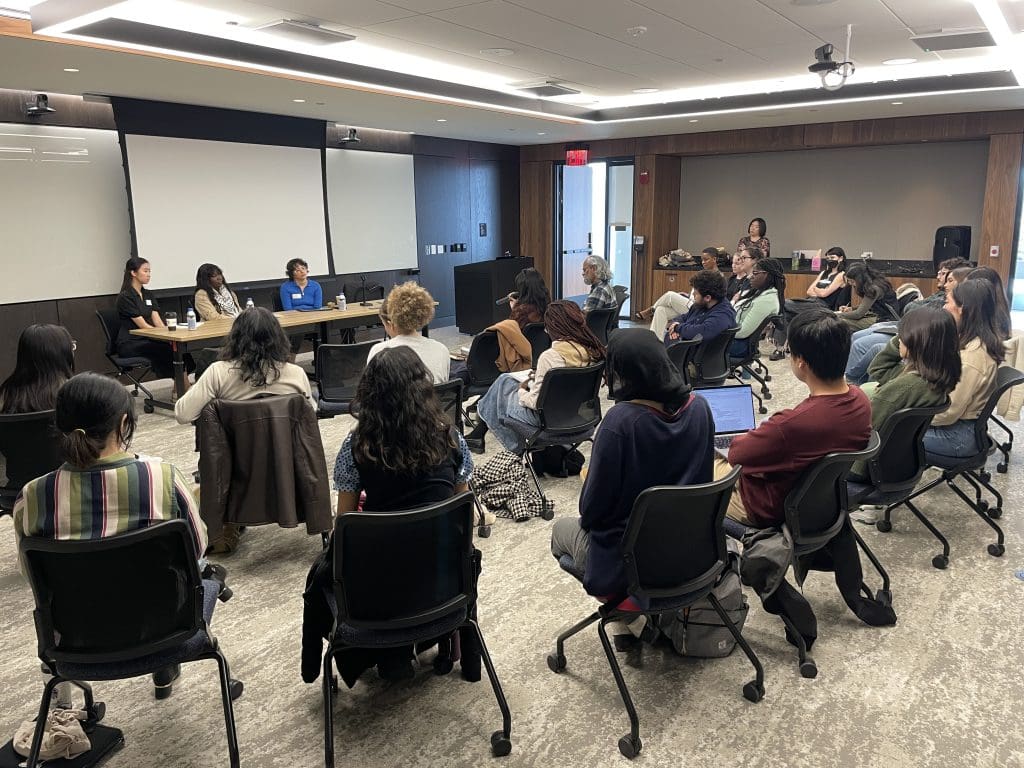By: Ga Eun Cho, Political Science, PhD Student
Last Friday, the Chloe Center for the Critical Study of Racism, Immigration, and Colonialism hosted a roundtable discussion about how various communities in the D.C. area have experienced—and are organizing against—different yet resonant forms of transnational and local displacement. The discussion was titled “Organizing D.C.’s Migrant Communities in the Wake of Displacement.”
The public roundtable, held in the Johns Hopkins University Bloomberg Center in Washington D.C., hosted representatives from three migrant communities: Haddy Gassama, National Director of Policy and Advocacy, UndocuBlack Network; Yesenia Portillo, Program Director, Committee in Solidarity with the People of El Salvador or CISPES; and Evelyn Yuen, Research Volunteer for the Viet Place Collective. The discussion was moderated by Professors Stuart Schrader and H. Yumi Kim.
Challenges Migrants Face
During the two-hour discussion and reception, the representatives shared their organizations’ histories and emphasized their commitment to empowering migrant communities. Displacement for the panelists represents both the factors that push people to leave their home countries and journey toward the United States, as well as the ongoing churn of urban development that threatens gentrification and dissolution of longstanding local bonds in Northern Virginia.
The three guest speakers emphasized the challenges migrants face in accessing accurate information about immigration policy, healthcare, and local politics. The key to tackling information disparity is increasing visibility through community organization, stressed Yuen, as migrant communities can collectively reach out to city council members, for instance, and show that “we are here and there is a community to preserve.”

For Gassama, official policies are not the only type of information that communities need. But even this information can be frustratingly difficult to access. Reflecting on her experience with displaced Black migrants, Gassama observed that the government’s data on “just how many migrants are there, and how many are detained” could be used as powerful tools of advocacy, if only the data were more easily available.
Migrants face countless difficulties, but the speakers emphasized the strength that comes from shared experience. Explaining the history of El Salvador and U.S. involvement in the civil war there, Portillo shared the importance of remembering and celebrating communal strengths, reflecting on her commitment that she is “honored to carry on the legacy of resistance in El Salvador” as a diaspora living away from home. Jeremy Giles (Writing Seminars, ’24) found it “really cool” to learn how CISPES helps members from Central America maintain “continued connections to their countries of origin.”
Migrant Groups Are Not Monoliths
The speakers all agreed, however, that migrant communities are not monoliths, marked by differences of age, class, sexuality, and more. Cleo Bluthenthal (Public Health Studies, ‘24) noted that the panelists left her with “important takeaways” about how “intersectional frameworks are essential to achieving and securing the protection of civil and human rights for those who have immigrated to America.” Similarly, Diana Garza (Public Health Studies, ‘24) learned that “increased and diverse representation is not the end all be all that many people think that it is.” Instead, coalitions and political education can bring groups together around shared goals beyond simply a proverbial seat at the table.
Nicole Rivas (International Studies, ’24) appreciated how Gassama does not shy away from disagreement among the undocumented Black migrants who compose her organization’s membership, “asserting that one of her favorite parts of her job happens to be those sometimes-awkward moments when she has to ‘massage out tensions’ with community members.”
After a wide-ranging question-and-answer session, the event concluded with a reception. Students, community members, and speakers engaged in further discussion of how to connect and empower migrant communities through shared political organizing.
Funded by a Nexus Award, this panel was staged as part of two current undergraduate community-engaged courses—one on Asian diasporic history and the other on the military-industrial complex, both focused on the D.C. area—that belong to the new and upcoming Critical Diaspora Studies (CDS) major at Hopkins. CDS will enable students to study the solidarities and dissonances between geographical and cultural areas of study such as Asian-American, African diaspora, Indigenous, and Latinx studies.
Students “Quite Inspired”
At the event’s conclusion, students trekked back to Baltimore, feeling “quite inspired” and “particularly moved,” in the respective words of Rivas and Bluthenthal.
Over the remainder of the spring semester, students in both courses will finalize original research projects that analyze different aspects of migrant history in the region. They look forward to presenting findings at the Bloomberg Center on Saturday, April 27, with these three organizations’ members in the audience.
As Rivas concluded, “I think the panelists really put into perspective what is at stake for migrant groups when it comes to archiving, changing harmful narratives, recovering their history, and celebrating legacies of resistance.”
